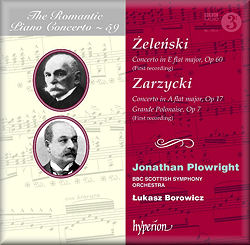| 
Support
us financially by purchasing this disc from |
|
|
|
|
|
Wladyslaw ZELENSKI (1837-1921) Piano Concerto
in E flat major, Op.60 (1903) [34:00]
Aleksander ZARZYCKI (1834-1895) Piano Concerto in A flat major,
Op.17 (1859-60) [17:21]; Grande Polonaise in E flat major, Op.7 (1859-60)
[10:03]
Jonathan Plowright (piano)
BBC Scottish Symphony Orchestra/Lukasz Borowicz
rec. June 2012, City Halls, Candleriggs, Glasgow
HYPERION CDA67958 [61:26]
Amazingly enough, this is now volume 59 in Hyperionís gargantuan
Romantic Piano Concerto series. Two Polish composers and contemporaries
share the billing.
Letís take Wladyslaw Zelenski first. He was born near Cracow he studied
there and in Prague and Paris. Back in Cracow he began a distinguished
pedagogic career - succeeding Moniuszko as composition teacher - before
moving to an even more distinguished position in Warsaw. He was soon
back in Cracow however and was eventually to become Director of the
Music Conservatoire. So, a strong academic pedigree and clearly an
important teacher Ė his most famous pupil was Stojowski.
The foregoing brief biography comes from a review of his chamber
music on this site and Iíve also reviewed a deal of his solo piano
music. Itís smaller-scaled Zelenski that Iíve usually come across
Ė his violin sonata is another such work Ė rather than his concertante
side so it was good to encounter the big-boned 1903 Concerto in E
flat major. Dedicated to the virtuoso Ignaz Friedman, itís cast in
heroic-romantic mould. The piano enters early and thereís rich Slavonic
lyricism in the second theme, with hints of Tchaikovsky and Saint-SaŽns.
Heís careful not to swamp the rhetoric in saturated string tone and
conductor Lukasz Borowicz and Hyperionís engineers do well to explore
the exchanges between piano and wind principals. Thereís a slightly
antique, but very melodic dance at the heart of the slow movement
which is a theme and variations, also sporting a flighty allegretto
vivace and a warmly textured Quasi adagio. The finale
relinquishes introspection with a lively Krakowiak, neatly syncopated,
and with a well-judged contrasting slow section accompanied (once
again) by attractive wind commentary. Throughout, Jonathan Plowright
shows considerable stylistic affinity with the music
and plays with fire and poetry. This is apparently the first ever
recording of the work Ė and itís more than welcome.
His confrere Aleksander Zarzycki was the first director of the Warsaw
Music Society in 1871 and had been, in younger days, a fine pianist.
One of the pianists he subsequently engaged for a post at the Warsaw
Music Institute was Paderewski. Violin fanciers may know his name,
ironically, more than pianophiles because his Mazurka in G, Op.26
was a favourite encore of David Oistrakh and was also recorded no
fewer than three times by the Polish fiddler Bronislaw Huberman. Others
who left recordings of it include Isolde Menges, Ossy Renardy, Zino
Francescatti and Wanda Wilkomirska. So, a good pedigree for violinists,
but what of the strange A flat major Piano Concerto composed in 1859-60?
This sounds like Ė and probably is - a torso, shorn of its opening
movement, as it begins with an Andante. Dedicated to Nikolai
Rubinstein the whole affair seems shrouded in mystery, as the published
version of the concerto was apparently a revision. What of, and how
much, seem to be unknown. So we have two-thirds of a concerto, realistically
speaking, but this is all that we have. The slow movement is lyrical
though not especially distinctive. But the finale is, like his compatriotís,
a Krakowiak but one which makes the rhythm very much more overt and
even galumphing. Itís a stop-start rhythm anyway, but Zarzycki takes
great delight in its abrupt, disjunctive qualities. His Grande
Polonaise was completed in the same year as the concerto and
is couched in rather sprightly operatic fashion. Itís all a bit obvious
and bombastic. Plowright does what he can with it.
Adrian Thomasís notes are good and the recording quality is first
class.
So this is a most interesting but occasionally perplexing coupling.
I strongly advocate the Zelenski, and will leave the question of Zarzycki
to you.
Jonathan Woolf
See also review of the 24/96 download by Dan
Morgan
|














